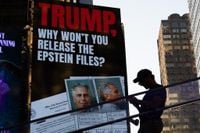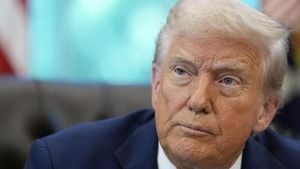On August 20, 2025, the shadow of Jeffrey Epstein once again loomed over American politics and royalty, as new revelations and political disputes reignited debate about the reputations of former President Donald Trump and Britain’s Prince Andrew. Both men have long denied any wrongdoing in connection to Epstein, the disgraced financier and convicted sex trafficker, but their past associations continue to generate controversy and anxiety among their supporters and critics alike.
According to The Daily, royal biographer Andrew Lownie issued a stark warning: "The questions will keep coming, whether he likes it or not," he said of Trump’s decade-plus friendship with Epstein. Lownie, whose new book The Rise and Fall of the House of York devotes a chapter to Prince Andrew’s entanglement with Epstein, draws a direct parallel between the royal’s downfall and the risks facing Trump. "The Epstein connection destroyed Andrew's public life – and Trump risks the same fate if fresh details emerge," Lownie told Radar Online in an exclusive. He added, "If there's one thing history shows, it's that proximity to Epstein stains reputations permanently."
Prince Andrew’s own public life was upended after he reached an out-of-court settlement with Virginia Giuffre in 2022, following allegations connected to Epstein’s trafficking network. Lownie’s assessment is blunt: while Trump may avoid criminal charges, the mere association with Epstein could leave a permanent mark. "But the Epstein connection will always be there, just as it is for Andrew," he remarked, suggesting that the reputational damage is already set in stone, regardless of legal outcomes.
Photographic evidence, Lownie notes, underscores the closeness of these relationships. A widely circulated image captures Trump, Prince Andrew, Jeffrey Epstein, and Ghislaine Maxwell together at Mar-a-Lago on February 12, 2000. When asked about this, Lownie confirmed, "Yes, there's photographic evidence of them together." Both Trump and Andrew have repeatedly denied any criminal activity related to Epstein, and neither has been formally accused of wrongdoing. Yet, as Lownie pointed out, the stain of the association lingers, with the Royal Family and Trump’s political base alike gripped by anxiety over what new details might emerge.
Recent developments have only heightened the scrutiny. On Tuesday, House Oversight Ranking Member Robert Garcia directly contradicted Oversight Chair James Comer’s claims regarding former Attorney General Bill Barr’s testimony before the committee. Comer had asserted that Barr "had never seen anything that would implicate Trump in any of this." Garcia, however, issued a statement saying, "Barr could not clear President Trump of wrongdoing." He called on Comer to "release the entire unedited transcript of his interview to the public," according to reporting from Meidas Touch.
Since early July, the Trump administration has faced mounting pressure over the so-called Epstein files. The Justice Department, as The Wall Street Journal reported, notified Trump months ago that his name appeared multiple times in those files. Instead of proactively releasing the documents and embracing transparency, Trump’s team has been accused of seeking distractions. Notably, new reports have surfaced highlighting a letter Trump penned to Epstein for the financier’s 50th birthday, as well as testimony from the former chief operating officer of Trump’s Atlantic City casino, who placed both Trump and Epstein with three underage girls in the late 1980s. These details, while not direct evidence of criminal conduct, have fueled public suspicion and intensified calls for accountability.
Despite the growing demands for openness, the political response has been anything but straightforward. Kentucky Republican James Comer, who leads the House Oversight Committee, has issued a broad subpoena to the Justice Department, demanding communications from the Epstein and Maxwell case files. This includes records about communications between President Joe Biden’s administration and the Justice Department regarding Epstein, as well as documents related to an earlier federal investigation into Epstein in Florida that resulted in a controversial non-prosecution agreement.
Yet, critics argue that this investigation is more about political maneuvering than genuine accountability. According to PBS, the Oversight Committee’s actions have been seen by some as an attempt to shift attention away from Trump and toward Biden, whose name has never been suggested to appear in the Epstein files. The committee’s focus on communications involving the current administration, rather than scrutinizing Trump’s own possible involvement, has drawn accusations of partisanship and deflection.
Meanwhile, the Trump Department of Justice is set to begin turning over documents from the Epstein investigation to the House Oversight Committee starting Friday, August 22, 2025. This move, while potentially significant, is clouded by skepticism about whether it will lead to any meaningful revelations or simply provide more fodder for partisan disputes.
Adding another layer to the controversy, former Trump personal lawyer and Deputy Attorney General Todd Blanche interviewed Ghislaine Maxwell, Epstein’s longtime associate, in July 2025 before she was transferred to Federal Prison Camp Bryan in Texas, a minimum-security facility sometimes dubbed a "country club prison." Blanche’s involvement has raised eyebrows, especially given his previous role defending Trump during his 2024 criminal trial. Claire Finkelstein, a law professor at the University of Pennsylvania, voiced her concern to NPR: "It is very concerning when you have someone who was formerly the president's personal lawyer then getting involved to possibly assist the president in protecting his own image in this — when he should be acting in a disinterested way for the Justice Department to ensure that justice is done here and that the interests of the American people are served."
As the political wrangling continues, House Oversight Ranking Member Garcia has called for full transparency. "Let’s put all of these tapes and depositions out to the public," he urged. "We have nothing to hide here." Garcia further insisted, "In no way did Bill Barr say anything that was groundbreaking in a way to halt our desire and need for justice for these victims and our certainty that Donald Trump and his name and other folks that may have been involved in different ways with Epstein are not in these files. We know that they are." He characterized Barr’s testimony as part of "an act of Republicans trying to control a narrative."
The latest round of revelations and political infighting underscores how the Epstein scandal continues to cast a long shadow over powerful men on both sides of the Atlantic. For Trump, as for Prince Andrew, the consequences may be less about criminal liability and more about the enduring stain on their legacies. As Lownie cautioned, "the shadow will not fade." The real question now is whether the coming document releases and ongoing investigations will bring any closure—or simply ensure that the questions, and the anxieties, never quite go away.




